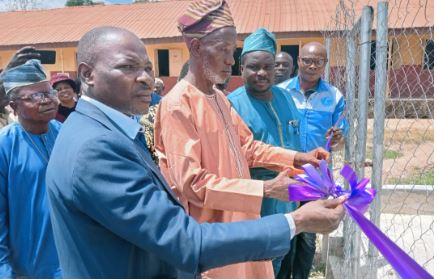Paragraph 1: A Collaborative Effort for Improved Sanitation
The Oyo State Government, partnering with the United Nations Children’s Fund (UNICEF), has embarked on a mission to enhance sanitation and hygiene in rural communities. This collaborative effort has resulted in the commissioning of solar-powered boreholes and toilet facilities in Egbeda, Ona Ara, and Ibarapa East Local Government Areas. This initiative signifies a crucial step towards addressing the pressing needs of these communities and promoting the well-being of their residents, particularly women and children who often bear the brunt of inadequate sanitation infrastructure. The projects underscore the commitment of both the state government and UNICEF to ensuring equitable access to essential services like clean water and sanitation for all citizens, regardless of their location.
Paragraph 2: Sustainable Solutions for a Healthier Future
The newly commissioned facilities represent a shift towards sustainable and community-focused solutions. The solar-powered boreholes offer a reliable and environmentally friendly source of safe drinking water, addressing the long-standing challenge of water scarcity. The accompanying toilet facilities form a critical component of a broader campaign to promote hygiene and eradicate open defecation, a practice with significant health and environmental repercussions. By investing in these sustainable infrastructure projects, the Oyo State government is not merely addressing immediate needs but also laying the groundwork for a healthier and more prosperous future for its citizens.
Paragraph 3: Expanding Access and Empowering Communities
The commissioning of these projects is not an isolated event but rather a milestone in a larger, ongoing effort to extend water and sanitation services throughout all 33 local government areas of Oyo State. This commitment to comprehensive coverage demonstrates the government’s dedication to ensuring that no community is left behind in the pursuit of improved public health and well-being. The projects, implemented under the joint initiative of the Oyo State government and UNICEF, are designed to be inclusive and to empower communities by providing them with the resources they need to manage their own water and sanitation needs sustainably.
Paragraph 4: Celebrating Partnerships and Progress
The inauguration of the water and sanitation facilities marks a significant achievement for all stakeholders involved. It underscores the power of partnerships and the effectiveness of collaborative efforts in addressing complex development challenges. The event also serves as a platform to celebrate the progress made in improving access to safe water and sanitation across Oyo State. The combined efforts of OYORUWASSA, the state’s rural water supply and sanitation agency, UNICEF, and local communities have resulted in tangible improvements in the lives of countless individuals, particularly women and children.
Paragraph 5: A Model for Integrated WASH Interventions
The success of these projects in Oyo State has garnered recognition and praise, positioning the state as a potential model for integrated Water, Sanitation, and Hygiene (WASH) interventions in Nigeria. The collaborative approach, the focus on sustainability, and the commitment to community involvement have all contributed to the positive outcomes observed. This success story highlights the importance of strong leadership, effective partnerships, and community ownership in driving sustainable development initiatives. The Oyo State model offers valuable lessons for other regions seeking to improve their WASH infrastructure and promote positive hygiene behaviors.
Paragraph 6: Sustaining Gains and Ensuring Long-Term Impact
While the commissioning of these facilities represents a significant step forward, the focus must now shift to ensuring the long-term sustainability and impact of these interventions. Maintaining the infrastructure, promoting continued hygiene education, and fostering community ownership are crucial to preserving the gains made. Continued investment in WASH infrastructure, robust monitoring systems, and the active participation of local governments, traditional leaders, and civil society organizations are essential to ensure the lasting impact of these projects. The collective goal is to create a culture of maintenance, education, and inclusivity that will sustain these improvements for generations to come.


